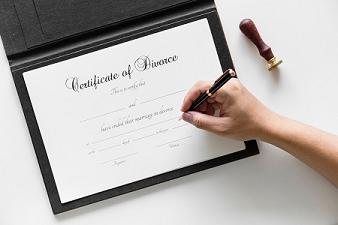Table of Contents
Did you know that there is a divorce in the United States every 13 seconds? This is 6,646 divorces every day and 2,419,196 divorces each year. That is an incredible amount, isn’t it? When a couple divorces this triggers the creation of a divorce record. In the United States divorce records are usually up to date and accurate.
A divorce only becomes legal in the US after a court provides a divorce decree. This confirms the termination of the marriage. It may take a while to issue the decree and during that time a couple is not legally divorced. A couple may have split amicably but the decree makes everything final.
What is included in a Divorce Decree?
The divorce decree must contain details of all issues pertaining to the divorce. A divorce decree will include details of most of these issues:
- Child custody for children of the marriage
- Visitation rights for spouses to see their children
- The amount of child support needing to be paid and by who
- Any spousal support (alimony) payments
- The division of property
In a lot of cases, divorces are uncontested and they will happen a lot faster than if there is a conflict between the spouses. It does not matter if an uncontested divorce occurred, full details of the issues still have to be included in the final divorce decree.
A Divorce Decree is not always the Final Word
In most cases, a divorce decree signifies the termination of a marriage. But in some cases, it is the initial document for the start of an appeal process. Usually, you cannot begin a divorce appeal without the court issuing a divorce decree first.

Sometimes the details of a divorce decree need changing. A good example of this is where child support or spousal support payments are affected by a dramatic change in circumstances.
The spouse responsible for the payments may have lost their job or suffered an injury which prevents them from working. In this case their income dries up and they cannot fulfill their obligations. If the spouse responsible for paying comes into a lot of money then the receiving spouse has the right to request a change to the details.
Another example is child visitation rights and custody. Circumstances may change and this can affect these rights. When this happens either spouse can request a modification to make the appropriate changes.
Why are Divorce Records important?
The government at state and national level needs divorce records for the calculation of vital statistics. These statistics will show the number of divorces and the trends over the years. They will be interested to see if the amount of divorces each year is trending upward, downward or remaining flat.
A divorce record confirms that a marriage has ended. Divorce records are in the public domain but they are not always to find. If you are in the United States you can use an online background check service to find divorce records. We will discuss this in more detail later.
Some people confuse a divorce decree with a divorce certificate. They are not the same. A divorce decree is a detailed document that includes details of the divorce issues and the responsibilities of both spouses going forward. A divorce certificate is very simple in comparison and will include the following:
- Confirmation of the divorce
- The full names of both ex spouses
- Where the divorce took place
- The divorce date
A divorce certificate has a number of important uses. You need to bear in mind though that not all states will provide you with a divorce certificate. Here are some of the important things that you can use a divorce certificate for:
- Confirming that you are divorced without disclosing the details
- Getting remarried
- Confirming a name change on important documents such as passports and driving licenses
- Obtaining a visa to travel to another country
- Other official purposes such as insurance, inheritance, bank accounts, etc
If a person is divorced and wants to remarry then they will need to provide their divorce decree document in some states before the issuance of a new marriage license. A divorce certificate will not suffice everywhere. You need to check the laws of your state to see if this applies.
You may have to provide a divorce decree for a name change as well. You will need to check with the issuing authorities for passports, driving licenses, visas etc to see if a divorce certificate will suffice.

Accuracy of Divorce Records
When you receive your divorce decree it is vital that you check all of the details for accuracy. The decree forms the basis of a computerized divorce record and if there are errors in it then the divorce record becomes inaccurate. It is impossible for the authorities to know how accurate their divorce records are. Individual checking is the only solution.
If you hired a lawyer to handle your divorce then it is a good idea to ask them to check the details included in the divorce decree as well. Any errors need to be reported to the court immediately so that they can issue an updated decree.
Most divorce decrees will contain responsibilities going forward for both of the former spouses. If the details here are incorrect then this can have a devastating effect. You do not want to have to do something that was not part of your divorce settlement.
Why would you need to check Divorce Records?
If you are looking for a relationship and find someone that you are really attracted to then you want to be sure that they are telling you the truth about their marital status. There have been a number of cases where people have stated they are divorced when they are not. You cannot marry another person who is still married in the United States.
The proliferation of online dating has just compounded this problem. It is very easy for someone to lie online about a number of different things. You may think that you really know a person through chatting online but the reality is that you do not.
Relationships are all about trust. If someone tells you that they are divorced then you can use a background checking service in the United States to confirm this. It is a good idea to do this right at the start to save yourself from heartbreak in the future.
Divorce Records by State
- Alabama Divorce Records
- Alaska Divorce Records
- Arizona Divorce Records
- Arkansas Divorce Records
- California Divorce Records
- Colorado Divorce Records
- Connecticut Divorce Records
- Delaware Divorce Records
- District of Columbia Divorce Records
- Florida Divorce Records
- Georgia Divorce Records
- Hawaii Divorce Records
- Idaho Divorce Records
- Illinois Divorce Records
- Indiana Divorce Records
- Iowa Divorce Records
- Kansas Divorce Records
- Kentucky Divorce Records
- Louisiana Divorce Records
- Maine Divorce Records
- Maryland Divorce Records
- Massachusetts Divorce Records
- Michigan Divorce Records
- Minnesota Divorce Records
- Mississippi Divorce Records
- Missouri Divorce Records
- Montana Divorce Records
- Nebraska Divorce Records
- Nevada Divorce Records
- New Hampshire Divorce Records
- New Jersey Divorce Records
- New Mexico Divorce Records
- New York Divorce Records
- North Carolina Divorce Records
- North Dakota Divorce Records
- Ohio Divorce Records
- Oklahoma Divorce Records
- Oregon Divorce Records
- Pennsylvania Divorce Records
- Rhode Island Divorce Records
- South Carolina Divorce Records
- South Dakota Divorce Records
- Tennessee Divorce Records
- Texas Divorce Records
- Utah Divorce Records
- Vermont Divorce Records
- Virginia Divorce Records
- Washington Divorce Records
- West Virginia Divorce Records
- Wisconsin Divorce Records
- Wyoming Divorce Records